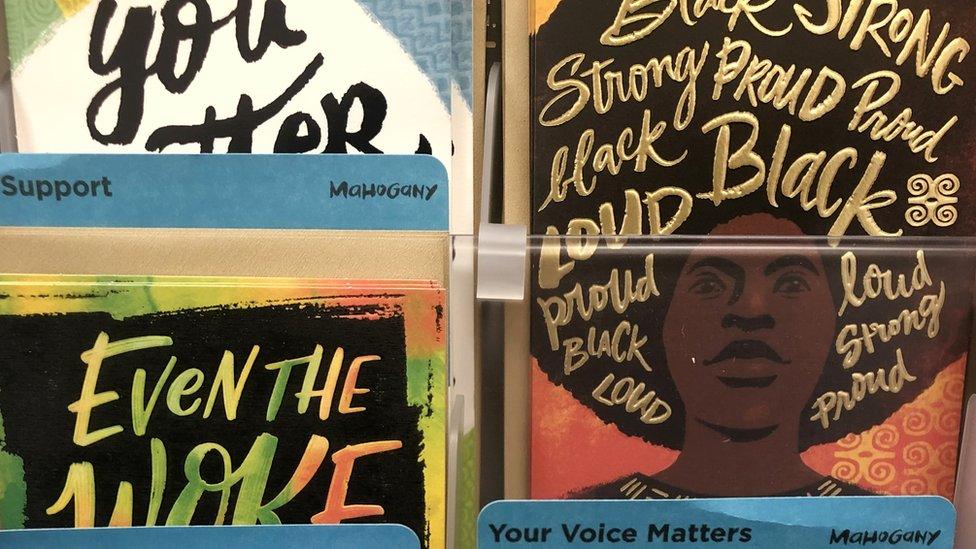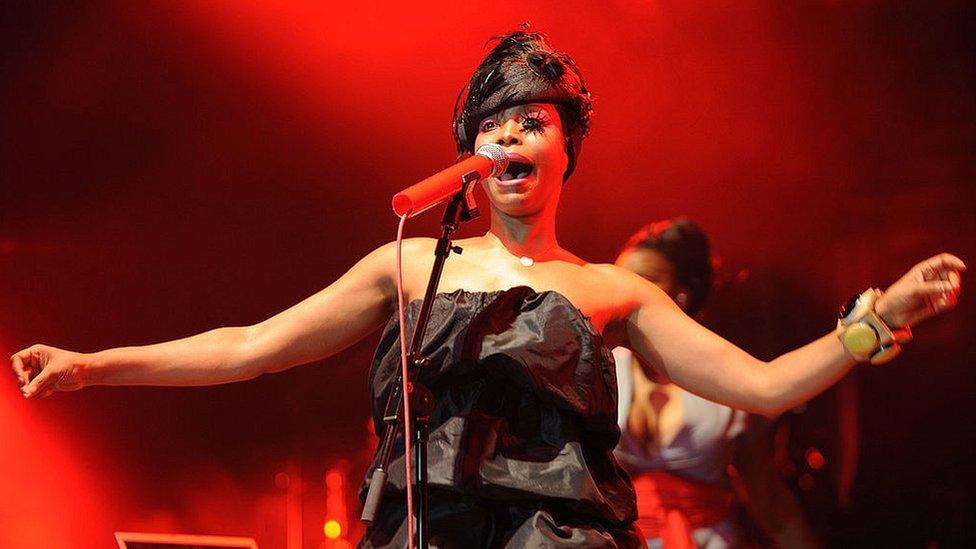Woke: Compliment or criticism, it is now fuelling the culture wars
- Published

Woke-themed greetings cards on display in a New York drugstore
As MPs paid tribute to outgoing Speaker John Bercow on Halloween 2019, a piece of parliamentary history was made when veteran Labour MP Harriet Harman stood up to speak.
"You've been on what they described as a political journey," she told Mr Bercow, whose views famously moved to the left during his 22 years as an MP. "I would say you are woke now."
For the first time, the W-word had entered the House of Commons.
In the two years since it's become a regular feature of political debates, used as a badge of honour by some on the left, but more often as an insult by those on the right.
Its origins, however, don't fit neatly into either camp.
"The person who many people consider coined it was [the novelist] William Melvin Kelley," says Elijah Watson, news and culture editor of American music website Okayplayer and author of a series of articles called The Origin of Woke.
"In 1962 he published a New York Times essay titled If You're Woke, You Dig It.
"This piece really foreshadowed woke's more genuine and sincere and black-centric origins, and how it would inevitably become appropriated by the masses.
"It wasn't really until the late 2000s, early 2010s, when it gained more of this kind of political context. Although I would say that's been there underlying, it never explicitly became that until recently."

Erykah Badu popularised the phrase "Stay woke"
In 2008 singer-songwriter Erykah Badu used the phrase "Stay woke" in her song Master Teacher.
"It then took a new life of its own when she started tweeting it," says Watson.
"'Stay woke' really is about staying aware of injustices happening both in America and abroad."
But as the phrase became more popular, Watson says woke lost its meaning.
"There isn't that sincerity and that genuineness that woke may have had once before, because it's no longer in the possession of the people who made it," he says.
Eventually, "Stay woke" was distilled into little more than an ironic online joke, but as the term has found its way into Washington and Westminster, it has become more divisive.
Compliment or insult?
"People are very split on what it means," says Bobby Duffy, director of King's College London's Policy Institute.
His team has been researching the UK's culture wars, including what people think of the word woke.
"A quarter of people think of it as a compliment, a quarter of people think it's an insult and the rest either don't know or have never even heard of the term," Prof Duffy says.
"Among the young, over half of them think it's a compliment, but only 13% of the oldest group think it's a compliment."
The Policy Institute's research suggests the word's meaning has started to change once more.
"It's been much more linked in the media to debates around cancel culture," says Prof Duffy.
"That is something that does land more with people in some ways than some of the more difficult inequality debates around race or gender."

Statues of historical figures have become a major source of controversy
Prof Duffy says an international survey suggests the UK is "the most concerned" of all countries about people having to "be too careful about the things that we say".
Cabinet minister Jacob Rees-Mogg is among those who has invoked woke to criticise people on the left during debates about statues of historical figures and free speech on university campuses.
The right of centre Spectator magazine's deputy political editor Katy Balls says some Conservative MPs and ministers are using the word in a pejorative way in the hope of connecting with new Tory voters in the north of England.
"They believe that, when it comes to their new coalition of voters, one of the things these voters feel very strongly about is patriotism," she says.
"You are signalling to your voters that you stand up for traditional values and they think that does play very well."
Culture war
But there's a growing concern among some Conservatives that focusing on issues in the so-called "red wall" parliamentary seats previously held by Labour could play badly in the party's traditional heartlands.
"[They're] very uncomfortable with this idea of having a culture war. They don't really want to have a war on woke," says Balls.
Ash Sarkar, contributing editor for the left-wing Novara Media group, says the increasing use of the word woke reflects a more general change in politics in the age of the internet.
She argues that differences on issues such as climate change and race are fuelling its use as a negative term - and that it has become a "convenient vehicle for lots of right-wing anxieties about a generational divide in political outlook".
Prof Duffy agrees that understanding of the word woke is "almost certainly" becoming more negative, but adds: "This is a new term for the vast majority of the population. People are still forming their views and those types of discussions will have a big effect on people's perceptions of the term."
So how do African Americans feel about a word coined as a largely positive term being used as an insult in politics on both sides of the Atlantic?
"At a certain point, there was a frustration," says Watson, "but now it's more of an indifference.
"Kelley was speaking to how black slang becomes appropriated in 1962. We're almost 2022 and we're still dealing with that same problem."
Listen to Jack's report at 22:00 BST on Sunday, on BBC Radio 4's The Westminster Hour.